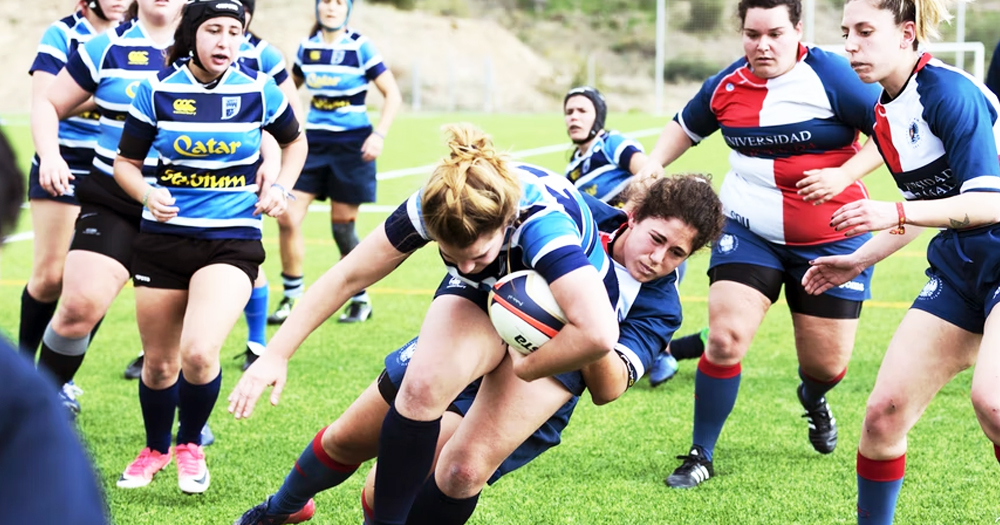Last week, the Rugby Football Union (RFU) in England officially banned Trans women from competing in full-contact rugby, voting on new rules that will come into effect for their 2022/2023 campaign.
On July 29, RFU voted on its Gender Participation Policy and, with a vote of 33 to 26 with two abstentions, approved new rules that officially prohibit Trans women from playing in the female category in full-contact rugby. According to the new policy, now only players who were assigned female at birth will be allowed to participate in that category in England.
The decision comes shortly after British Triathlon became the first sport in the UK to ban Trans athletes from racing in women’s competitions in July, following a string of similar moves from international governing bodies that issued bans for Trans women in sports such as swimming and rugby.
Commenting on the adoption of the new policy, RFU president Jeff Blackett said: “Inclusion is at the heart of rugby values and we will continue to work with everyone to keep listening, learning and finding ways to demonstrate there is a place for everyone in our game.”
He then added: “We know that many will be disappointed by this decision, however, it has been based on all the scientific evidence available.”
RFU Council votes in favour of change to gender participation policy
For more information:
Gender Participation Policy – Frequently Asked Questions
?https://t.co/KaD3j1kVS3RFU Gender Participation Video
?https://t.co/VpE7AmzyYS— Rugby Football Union (@RFU) July 29, 2022
But, as it is recognised even in their policy, there is no clear scientific evidence available that proves that Trans women have an advantage over cisgender women in competitive sports. Many researchers and scientific experts have at length questioned the issue and suggested that policies such as this are, in fact, not based on concrete evidence.
Before these new rules were voted, RFU allowed some Trans athletes to play in the female category on what was essentially a case-to-case basis. This was changed because, as it is stated in their policy, “there are no credible tests that can assess physiological variables (e.g., mass, strength, and power) for the purposes of measuring fair competition or safety when comparing players.”
On the day of the vote, a group of protesters gathered outside Twickenham Stadium. Among them was Julie Curtiss, a Trans athlete who was registered to play rugby in England, who said: “They have missed a one-time only opportunity to demonstrate their genuine commitment to diversity in the sport”. She added, “They have refused to engage with a minority group to try to find a way to expand the game into new areas.”
In the meantime, it was reported that two other cis Black women were banned from competing in the Olympics because of their natural testosterone levels. The two women are Namibian sprinters Christine Mboma and Beatrice Masilingi and they were the latest to be banned according to a rule that capped testosterone levels for women’s competitions in the 400-meter dash. All women affected by such rule are Black cis women from African countries.
Following on from yesterday vote by the RFU to ban Trans women I have stood down as the D&I lead for Hampshire rugby.
This policy goes against my personal views and I no longer feel it appropriate to represent the organisation in these matters.
If you wish to know my pic.twitter.com/RsvlLMBR1u
— Matthew Mason-Hames (@Matthew08348308) July 30, 2022
The World Athletics organisation cited an “unfair advantage” in justifying this policy, although they were widely criticised for its undertones of European racism and imperialism. Others have pointed out how such rule is also discriminatory against intersex athletes, whose physical features might not fit such binary categorisations.
In a 2019 column, journalist Ruby Hamad, author of White Tears/Brown Scars: How White Feminism Betrays Women of Color, spoke out about this issue saying: “As trans writers and activists have been telling us for quite some time, the concept of binary sex, that there are only two non-overlapping sexes and one is either one or the other, is not as clear cut as many claim”.
She also argued how efforts to bar these women from competing in the Olympics demonstrate “how easy it is to undermine women, in particular racialized women, by shifting the goalposts and requirements for entry into womanhood.” Indeed, if even natural testosterone levels now represent an obstacle for women competing in sports, maybe what these organisations need is to re-think their whole definition of womanhood to make it finally truly inclusive.
© 2022 GCN (Gay Community News). All rights reserved.
Support GCN
GCN is a free, vital resource for Ireland’s LGBTQ+ community since 1988.
GCN is a trading name of National LGBT Federation CLG, a registered charity - Charity Number: 20034580.
GCN relies on the generous support of the community and allies to sustain the crucial work that we do. Producing GCN is costly, and, in an industry which has been hugely impacted by rising costs, we need your support to help sustain and grow this vital resource.
Supporting GCN for as little as €1.99 per month will help us continue our work as Ireland’s free, independent LGBTQ+ media.
